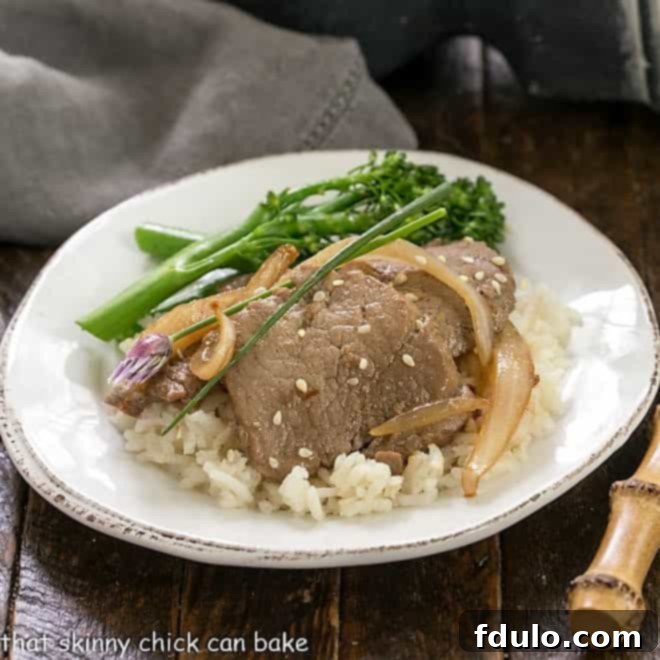Prepare to ignite your taste buds with this incredible Pork Bulgogi Recipe, a Korean stir-fry that effortlessly combines amazing flavors with a quick preparation time. This dish, featuring a truly fantastic Bulgogi Sauce, is a guaranteed family favorite that will have everyone asking for more!
Growing up, my husband’s culinary adventures rarely ventured beyond the familiar, with the occasional pizza being a daring escapade into “ethnic” food. It brings me immense joy to have broadened his palate, introducing him to diverse cuisines he now adores. Among his top new favorites is this irresistibly quick and scrumptious Korean Pork Bulgogi – a dish that proves how accessible and delicious global flavors can be.
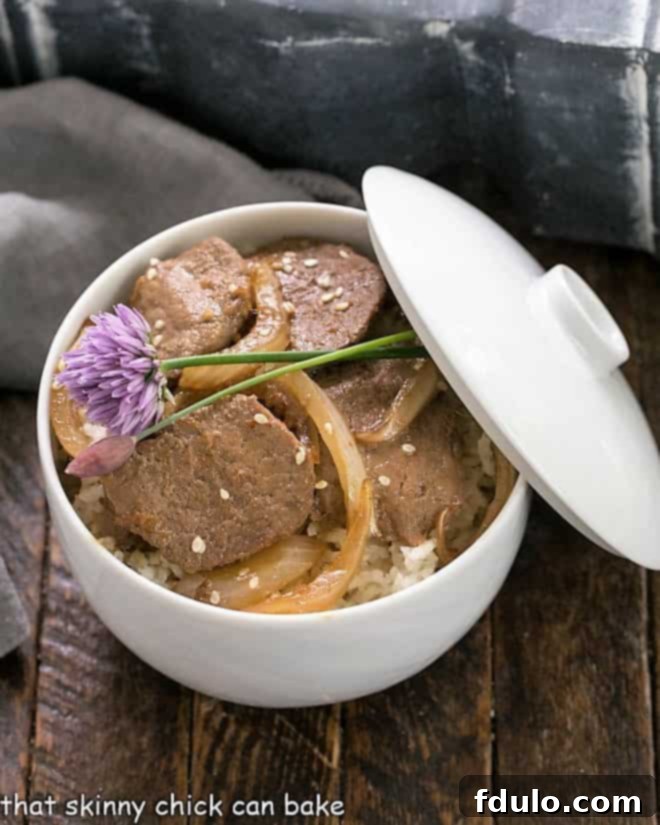
Why This Pork Bulgogi Recipe Belongs in Your Kitchen
There are countless reasons why this Korean Pork Bulgogi will become a staple in your recipe rotation. It’s more than just a meal; it’s an experience that delivers on taste, convenience, and versatility. Here’s why you absolutely must try it:
- A Rapid and Flavorful Weeknight Solution: In today’s fast-paced world, finding a dinner recipe that is both quick to prepare and bursting with flavor can be a challenge. This Bulgogi recipe is a true hero, coming together in minutes without compromising on the deep, savory, and subtly sweet notes that make Korean cuisine so beloved. It’s perfect for those busy evenings when you crave something special but are short on time.
- Your Gateway to Authentic Korean Cuisine: For those new to Korean food, Bulgogi offers a wonderfully approachable introduction. Its universally appealing flavors—a harmonious blend of savory soy, sweet sugar, aromatic garlic and ginger, and a hint of spice—make it an instant hit. It’s a comforting yet exciting dish that paves the way for exploring other Korean delights.
- Customizable to Your Spice Preference: Whether you prefer a mild hint of warmth or a fiery kick, this recipe is incredibly forgiving. You can easily adjust the amount of red pepper flakes to suit your personal heat tolerance, making it perfect for families with varying spice preferences.
- Incredibly Versatile Across Proteins: While we’re celebrating pork today, this incredible Bulgogi marinade and cooking method are fantastic with other proteins too. I’ve personally made it with chicken and beef, and it has always been a resounding success. This flexibility makes it an excellent choice for meal planning and adapting to what you have on hand.
If you’re eager to explore more Korean-inspired dishes, be sure to check out my Beef Bulgogi recipe for another delightful meal. And for a broader range of easy Asian-inspired meals you can whip up at home, take a look at these Quick and Easy Asian Take Out Recipes.
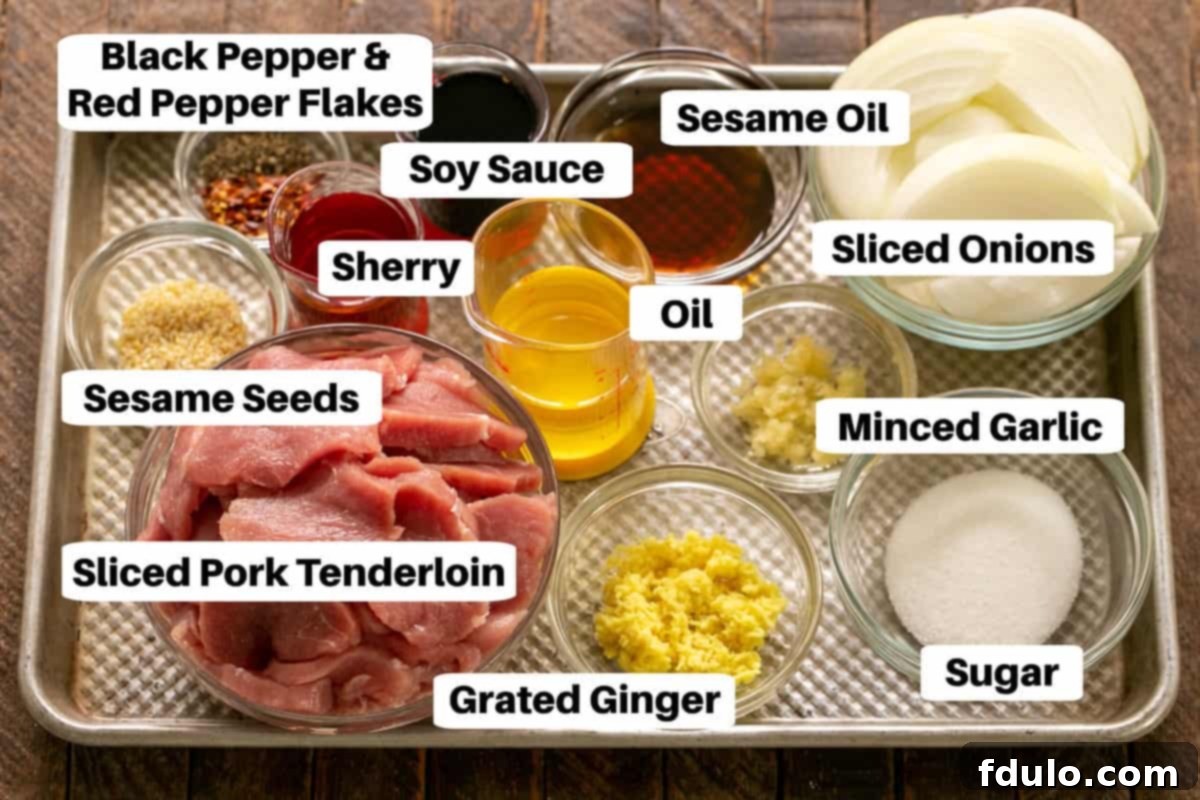
Key Ingredients for the Perfect Pork Bulgogi
Crafting exceptional Pork Bulgogi begins with understanding the role each ingredient plays in creating its signature flavor profile. Here’s a closer look at the components that make this dish truly special:
- Essential Pantry Staples: The foundation of our savory marinade relies on common kitchen items like Soy Sauce for its rich umami, Sugar to balance the saltiness and aid in caramelization, fresh Garlic for its pungent aroma, sweet and savory Onion, and a touch of freshly ground Black Pepper to enhance all the flavors.
- Pork Tenderloin: The Ideal Cut: For this recipe, Pork Tenderloin is my preferred choice. It’s lean, incredibly tender, and absorbs the marinade beautifully. A professional tip for achieving those perfectly thin, melt-in-your-mouth slices is to slice the tenderloin while it’s still slightly frozen. This makes it much easier to achieve wafer-thin cuts, which are crucial for quick cooking and maximum flavor penetration.
- Sesame Oil: The Aromatic Finisher: A drizzle of toasted Sesame Oil introduces a distinctive nutty and deeply aromatic layer, characteristic of many Asian dishes. It adds complexity and warmth to the overall flavor of the Bulgogi.
- Fresh Ginger: A Zesty Kick: Freshly grated Ginger provides a vibrant, zesty, and slightly spicy counterpoint to the other ingredients. To easily grate ginger, simply peel it with a spoon and then run it across a box grater or microplane. Its fresh essence is irreplaceable.
- Sherry or Sake: The Flavor Enhancer: A splash of dry Sherry or Sake (you can also use Mirin, a sweet rice wine) acts as a fantastic flavor enhancer. The alcohol helps to tenderize the meat and carry the flavors, while most of it evaporates during the cooking process, leaving behind a subtle depth.
- Red Pepper Flakes: Customizable Heat: The amount of Red Pepper Flakes is entirely up to your personal preference. Start with a smaller amount and add more if you desire a spicier Bulgogi. This allows you to tailor the dish from pleasantly mild to exhilaratingly spicy.
- Sesame Seeds: An Elegant Garnish: A sprinkle of toasted Sesame Seeds not only adds a delicate crunch but also serves as an attractive garnish, especially when you’re serving this dish to guests.
- Peanut or Canola Oil: High-Heat Cooking: For stir-frying, it’s crucial to use an oil with a high smoke point. Peanut Oil is an excellent choice for its subtle flavor and ability to withstand high heat, ensuring your meat browns beautifully without burning. Canola oil is a great alternative if peanut oil is not available.
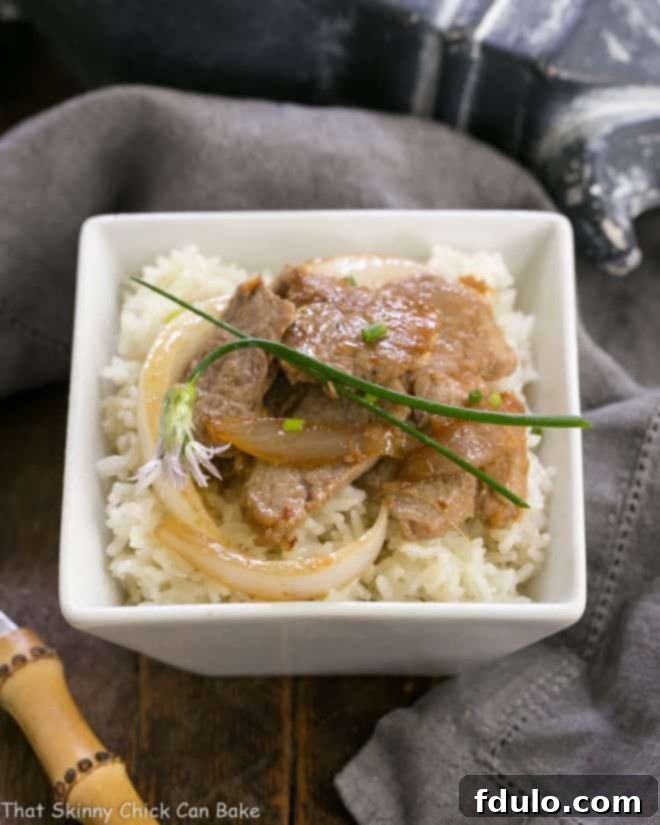
Mastering Pork Bulgogi: Expert Cooking Tips
This specific Bulgogi recipe, originally crafted by Norm and published in Everyday Food Magazine, quickly became a go-to in my kitchen. Its simple yet profound flavors explain its selection. Here are some expert tips to ensure your Korean stir-fry is nothing short of perfect:
- Choosing the Right Cut of Pork: The editors at Everyday Food magazine cleverly adapted Norm’s original recipe, opting for pork tenderloins instead of a fattier cut. Tenderloins are inherently lean and boast a fine texture, making them incredibly simple to slice into uniform, thin medallions. This choice ensures the meat cooks quickly and remains exceptionally tender, absorbing the marinade fully.
- PRO-Tip: Slicing for Success: Achieving those signature, wafer-thin slices is key to authentic Bulgogi texture and rapid cooking. My secret? I like to slice the pork while it’s still slightly frozen. The firm meat is much easier to cut precisely and thinly, preventing it from tearing or becoming ragged.
- Cook in Batches for Optimal Browning: To achieve that desirable caramelized exterior and prevent the meat from steaming (which can lead to a less flavorful, rubbery texture), it’s crucial to cook the pork quickly in small batches. Overcrowding the pan lowers its temperature, hindering proper browning. Take the time to cook in increments to maximize flavor development.
- The Right Cookware: Wok or Skillet: While a wok is traditionally perfect for stir-fries due to its high heat retention and sloped sides, a large sauté pan with high sides works equally well. The key is to have enough surface area to allow the meat to spread out and brown effectively.
- Efficient Stir-Frying Technique: When making any stir-fry, cook in stages. Add a small portion of the marinated pork and onion mixture to your preheated oil. Stir-fry quickly until it’s no longer pink and begins to brown. Remove this batch to a serving bowl before adding the next. This method ensures each piece of pork gets perfectly cooked.
- PRO-Tip: Customize Your Heat Level: The beauty of this spicy pork bulgogi recipe lies in its adaptability. If you’re a fan of fiery flavors, increase the amount of red pepper flakes. For a milder version, reduce them or omit them entirely. Taste and adjust until you achieve your ideal level of heat.
- Low-Carb Serving Suggestion: For those following a low-carb diet or simply looking for a lighter meal, serve this flavorful pork in crisp lettuce leaves instead of traditional white rice. It makes for a refreshing and satisfying alternative, turning your Bulgogi into a delightful Korean lettuce wrap.
- Elegant Finishing Touches: Elevate the presentation of your Bulgogi by sprinkling toasted sesame seeds over the finished dish. For an even more exquisite touch, if your garden is blooming, flowering chives add a gorgeous burst of color and a delicate oniony flavor.
Step-by-Step Guide to Making Delicious Pork Bulgogi
Making this incredible Pork Bulgogi is a straightforward process that yields impressive results. Follow these simple steps for a truly memorable meal:
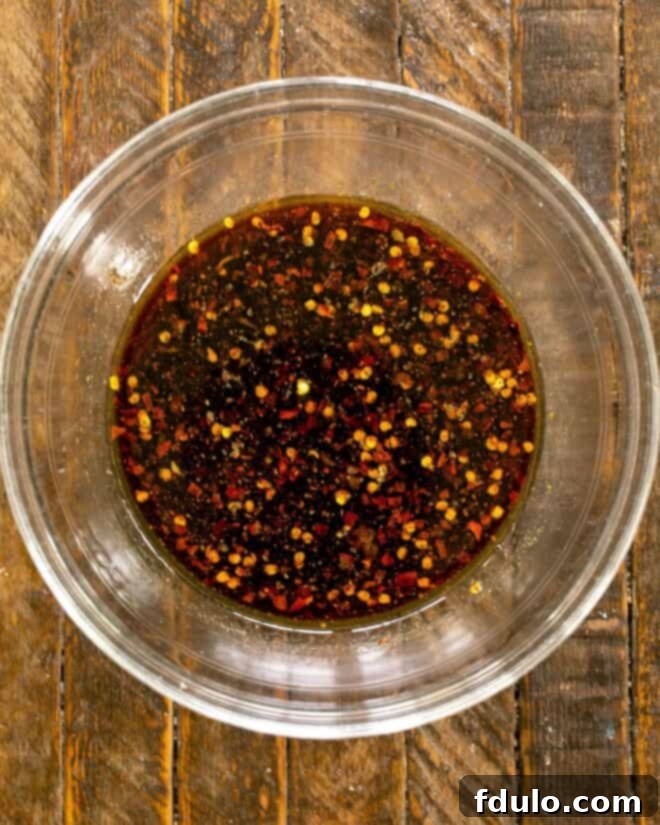
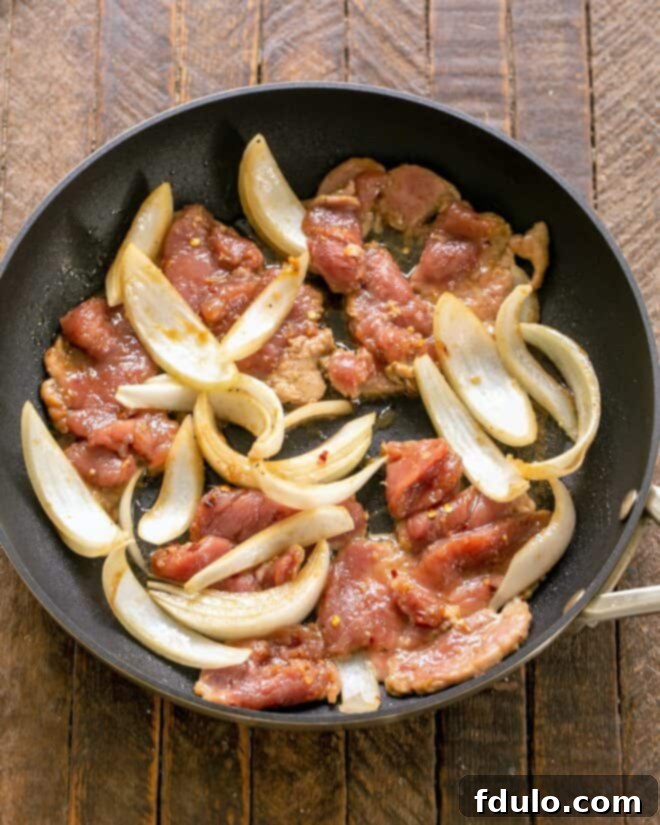
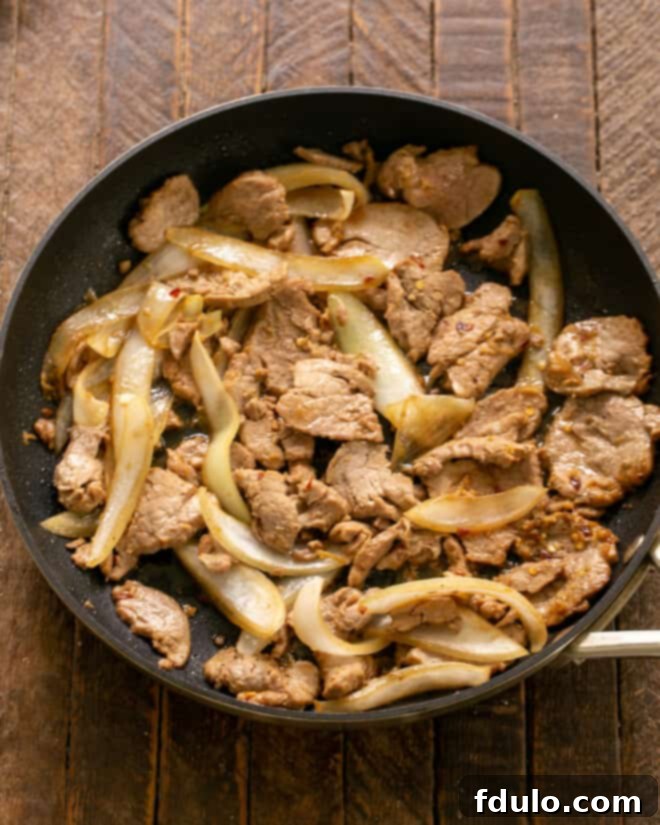

Your Questions About Pork Bulgogi Answered
Bulgogi (pronounced “bool-GOH-gee”), a name that literally translates to “fire meat” in Korean, refers to a traditional Korean dish typically made with thinly sliced, marinated meat, most commonly beef or pork. The meat is traditionally cooked over an open flame on a barbecue grill, but it’s also incredibly popular and delicious when prepared on a stovetop in a skillet or wok as a stir-fry. Its characteristic sweet and savory flavor makes it one of the most well-known and loved Korean dishes worldwide.
The Bulgogi sauce for this recipe is a magical combination of the initial marinade and the savory juices released during cooking. The marinade typically provides a complex flavor profile, including a blend of umami-rich soy sauce, naturally sweet sugar (often brown sugar or fruit purees like pear for tenderness and sweetness), pungent minced garlic, zesty grated ginger, aromatic sesame oil, a splash of sherry or sake for depth, and red pepper flakes to introduce a customizable level of heat. This balance of sweet, savory, and spicy is what gives Bulgogi its irresistible appeal.
Korean Bulgogi, with its rich and flavorful sauce, truly shines when served alongside fluffy white rice, which perfectly soaks up all the delicious juices. To complete your meal, consider offering a variety of fresh or pickled vegetable side dishes. Classic choices include light and crisp cucumber salad, a vibrant green vegetable like steamed asparagus, broccoli, broccolini, crunchy snow peas, or sugar snap peas. Don’t forget to include traditional Korean banchan (small side dishes) such as kimchi, which offers a delightful fermented tang that beautifully complements the sweet and savory Bulgogi.
For the most tender and flavorful results, always opt for a tender cut of meat for Bulgogi. While pork belly is a popular traditional choice for pork bulgogi due to its rich fat content that renders beautifully, I often recommend using readily available and leaner pork tenderloin, which slices easily and remains incredibly tender. For beef bulgogi, premium cuts like rib eye, sirloin, or beef tenderloin are ideal, as their marbling and tenderness allow them to absorb the marinade wonderfully and cook to perfection in minutes.
While you can certainly enjoy a Bulgogi recipe with a knife and fork, using chopsticks is the traditional and often preferred method. In Korean dining culture, Bulgogi is frequently enjoyed “ssam-style,” where a piece of the marinated meat is placed on a fresh lettuce leaf, often accompanied by a spoonful of rice, a dab of ssamjang (a spicy dipping sauce), or a slice of garlic. The leaf is then wrapped up into a small bundle and eaten in one bite, offering a delightful combination of textures and flavors. Feel free to experiment with this method for an authentic experience!
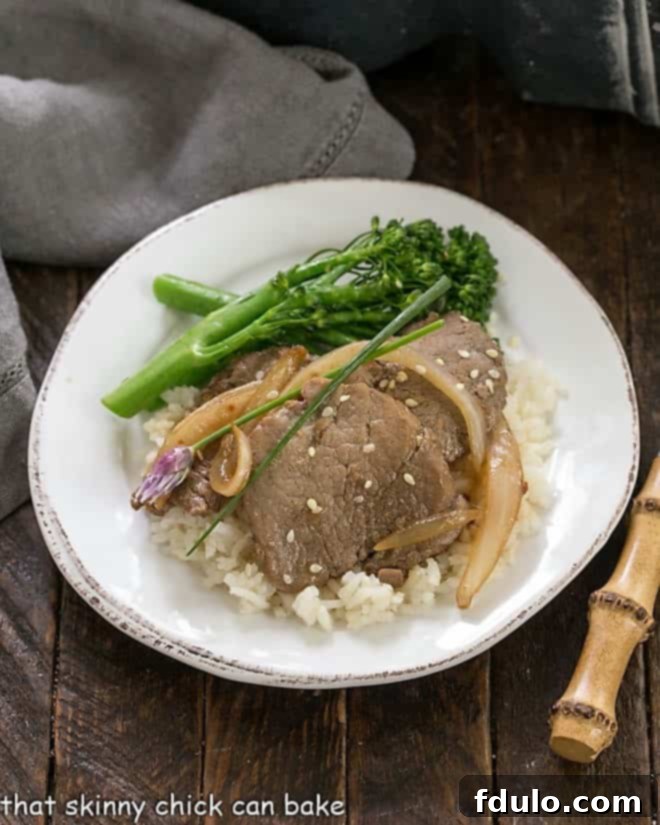
Explore More Delicious Pork and Asian-Inspired Recipes:
- Discover another fantastic way to prepare tenderloin with my Apple Mustard Pork Tenderloin.
- Ensure juicy and flavorful pork every time with The Best Pork Marinade.
- For a comforting and crowd-pleasing meal, try my easy Pulled Pork Sandwiches.
- Elevate your weeknight dinner with elegant Pork Chops Dijonnaise.
- Browse more inspiring and Easy Main Course Recipes for every occasion.
Stay connected and share your culinary creations with me through social media on Instagram, Facebook, and Pinterest. Don’t forget to tag me when you try one of my recipes! If you love the results, please consider leaving a 5-star rating in the recipe card below – your feedback is greatly appreciated!
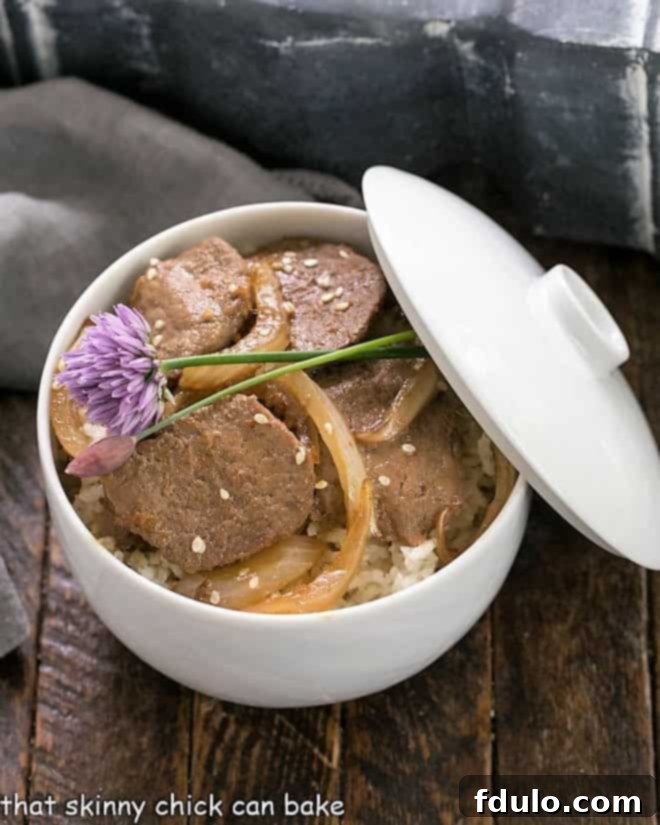
Pork Bulgogi
20 minutes
20 minutes
40 minutes
4 servings
A flavorful Korean stir-fry that comes together in minutes, perfect for any weeknight!
Ingredients
- 1 pound pork tenderloin (sliced wafer-thin, easy to do when partially frozen)
- ¼ cup soy sauce
- 2 tablespoons sugar
- 2 tablespoons sesame oil
- ¼ teaspoon freshly ground black pepper
- 4-6 cloves garlic (minced)
- 2 tablespoons freshly grated ginger
- 2 tablespoons dry sherry or sake
- 2 teaspoons red pepper flakes (adjust to your heat preference, e.g., ½ teaspoon for mild)
- 1 large onion (cut into 12ths)
- Toasted sesame seeds to garnish (optional)
- Peanut or canola oil
Instructions
- In a medium bowl, combine all ingredients except the peanut oil and sesame seeds. Mix well to ensure the pork is evenly coated. Set aside to marinate for at least 10 minutes, or longer if time permits, for deeper flavor.
- Heat peanut or canola oil in a wok or large skillet over medium-high heat until shimmering. Ensure the pan is hot enough to sear the meat.
- Add the marinated pork and onions to the hot pan in small batches. This prevents overcrowding, which can cause the meat to steam instead of fry. Cook each batch until the pork is no longer pink and begins to brown around the edges. Remove each cooked batch to a clean plate and set aside as you continue with the remaining pork.
- Once all the pork is cooked, return all the meat and onions to the pan. Briefly reheat everything together for 1-2 minutes, stirring gently, to ensure it’s piping hot and the flavors meld.
- Serve the flavorful Pork Bulgogi immediately over a bed of warm white rice. Garnish with toasted sesame seeds for an added touch of elegance and flavor, if desired.
Notes
Recipe courtesy of my friend, Norm Matthews, whose original recipe inspired this beloved dish.
Recommended Products
As an Amazon Associate and member of other affiliate programs, I earn from qualifying purchases.
- Measuring Spoons
- Immersion Blender
- OXO Cutting Board
Nutrition Information:
Yield:
4
Serving Size:
1
Amount Per Serving:
Calories: 521Total Fat: 30gSaturated Fat: 8gTrans Fat: 0gUnsaturated Fat: 20gCholesterol: 100mgSodium: 990mgCarbohydrates: 17gFiber: 2gSugar: 8gProtein: 34g
HOW MUCH DID YOU LOVE THIS RECIPE?
We’d love to hear from you! Please leave a comment on the blog with your thoughts, or share a photo of your delicious creation on Pinterest!
